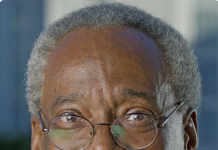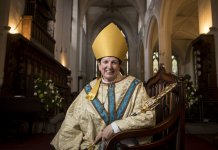Dear Brothers and Sisters,
Greetings in our crucified and risen Lord Jesus Christ. We believe that it is the ‘acceptable time’ to articulate a vision of what we hope for in the Lambeth Conference 2020. While all are free to offer their views, harsh disagreement ought not to be the dominant note the world hears from us. This multi-lingual letter lifts high those things held largely in common in order to build up and encourage. We claim no special authority, and thus speak to our fellow bishops as their brothers and sisters.
WE HOPE FOR A LAMBETH CONFERENCE BUILT ON COMMON FAITH
Though our provincial Books of Common Prayer show many variations, they all witness to the creedal center of our faith: the triune God, the divinity of Christ, His atoning death for the forgiveness of our sins, His bodily resurrection and ascension, and the Holy Spirit’s work in the Scriptures and the Church’s life. There is agreement, furthermore, in most of the Communion about the received, traditional teaching concerning the nature of marriage, which is in accord with Scripture. It found expression at Lambeth 1998 in Resolution I.10. Finally, we Anglicans share a common history, for example the See of Canterbury itself, which is a symbol of our apostolic roots and common life. We hope for a Lambeth Conference where we take this common inheritance of truth seriously and seek to build upon it for the sake of witness and teaching.
WE HOPE FOR A LAMBETH CONFERENCE MARKED BY CHARITY
At Lambeth, though a fractious family, we ought still to think of our fellow Anglicans in the best light possible. For example, there have been many important movements of mission and renewal in our Anglican tradition (e.g. the Oxford Movement and the East African Revival), and we can likewise see GAFCON in this way. We can also appreciate the role Global South Anglicans have played in strengthening the mission of Christ in their provinces. We commend the Primates’ view that only Churches aligned with Communion teaching should represent it in ‘doctrine and polity.’ But we are also willing to listen to our colleagues who hold in conscience dissenting views. More generally, we all need in our hearts to lay aside old recriminations, as each of us hears these Gospel injunctions: ‘bear one another’s burdens,’ ‘speak the truth in love,’ ‘do not let the sun go down on your wrath’ (Galatians6:2, Ephesians4:15,26).
MAY LAMBETH BE AN OCCASION OF HOPE FOR OURSELVES AND FOR THE WORLD
We hope for a Lambeth that is ordered to prayer and the Bible, that nourishes our humility, that opens us to God’s conversion in the Spirit, and that encourages us to renewed forms of teaching and witness which will inspire and attract younger generations in our nations and our churches. It is also crucial that we reject all forms of cultural and racial pride, while listening and deliberating with one another with full respect. I Peter, upon which Lambeth 2020 will meditate, says it best: ‘have unity of spirit, sympathy, love for one another, a tender heart, and a humble mind…always be ready to make your defense…for the hope that is in you’ (3:8,15).
United in faith, hope, and love, we can at Lambeth confront together the urgent problems in our Communion and in our world. We all share a worry about what may lie ahead in our common future, for as a divided Church we will struggle to witness to a divided, broken world. We hold in prayer those among us who face persecution and danger. We need to be stewards of creation. We hope for a conference which encourages us all to stand on the side of the poor and those who are maltreated, to call sinners to repentance and to offer forgiveness in the Lord’s name, to walk His way of love, and to seek reconciliation among ourselves and with our neighbors.
As it did a century ago, we hope Lambeth 2020 will remind us of the ecumenical calling from our Lord to be one as He and the Father are one (John 17:22). We do so by taking seriously the witness, gifts, and counsel of our brother and sister Christians in other churches. Within the Communion itself, some have felt frustration with the ‘Instruments’ over the past two decades, as they have struggled to balance autonomy and mutual accountability. We hope for a Conference that lays out a path ahead in the next decade, and we pray for the patience to walk it. We hope for a Conference in which we deepen our sense of ‘mutual responsibility and interdependence in the Body of Christ’ (Anglican Congress 1963), both in the program and in personal friendships.
Throughout, may we be reminded that our truly global Communion is not primarily a problem but rather a remarkable, though fragile, gift–a sign of the Church catholic.
Veni Sancte Spiritus.
Peace,
The Rt. Rev. George R. Sumner, the Episcopal Diocese of Dallas
The Rt. Rev. Michael G. Smith, the Episcopal Diocese of Dallas
The Rt. Rev. Lloyd Emmanuel Allen, Honduras, the Episcopal Church of Honduras
The Rt. Rev. Dr. Mouneer Hanna Anis, Diocese of Egypt with North Africa and the Horn of Africa
The Rt. Rev. Manuel Ernesto, Nampula, Mozambique
The Most Reverend Martin Nyaboho, Primate of Burundi, Diocese of Nampula
The Rt. Rev. Joel Waweru, ACK Nairobi Diocese
The Rt. Rev. Emma Ineson, Bishop of Penrith, Church of England
The Rt. Rev. Lydia Mamakwa, Mishamikoweesh, Anglican Church of Canada
The Most Rev. Daniel Sarfo, Primate of the Church of the Province of West Africa










